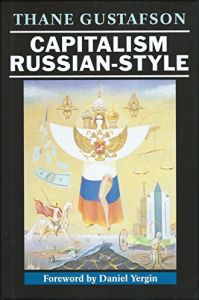Join getAbstract to access the summary!

Join getAbstract to access the summary!
Thane Gustafson
Capitalism Russian-Style
Cambridge UP, 1999
What's inside?
No one can be certain about Russia's economic future, but here are the factors to weigh — and the reasons those old-time Marxists are spinning in the crypts.
Recommendation
Thane Gustafson presents an overview of Russia’s experiment with capitalism to date. In this well-documented, well-reasoned report, he describes the breakdown in the Soviet economy. This collapse was already in the works when Gorbachev’s efforts to reform the system brought it tumbling down. Gustafson weaves his account together like a journalist, as he discusses the heady rush of capitalism, entrepreneurism, political corruption and crime that moved into Russia’s economic vacuum like a modern gold rush. He carefully traces recent developments in Russia’s attempt to recover from its 1998 financial disaster. As the book describes, no one knows what will happen in Russia. Gustafson emphasizes that Russia cannot return to its command economy. The book offers cautious optimism for future business with Russia. However, the admitted uncertainty of Russia’s future may frustrate readers who seek definitive answers. getAbstract recommends this book to readers interested in social and political developments and to academics as well as to executives of companies with economic interests in Russia, or those who may want to do future business there, although – for now – it may be a particularly risky venue.
Summary
About the Author
Thane Gustafson is a government professor at Georgetown University and a director of the Eurasia/Former Soviet Union Service of Cambridge Energy Associates. He wrote Crisis Amid Plenty: The Politics of Soviet Energy Under Brezhnev and Gorbachev and Reform in Soviet Politics: Lessons of Recent Policies on Land and Water. He co-authored Russia 2010, and What It Means for the World.


















Comment on this summary